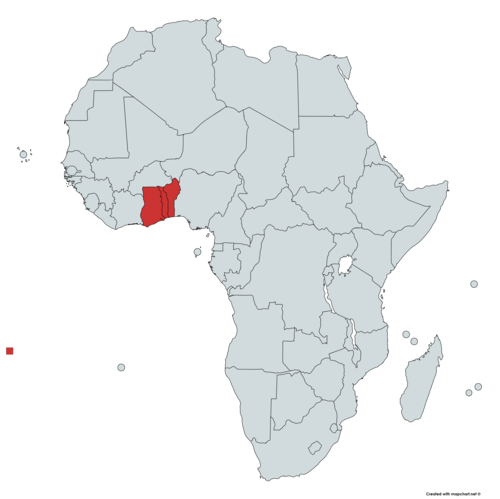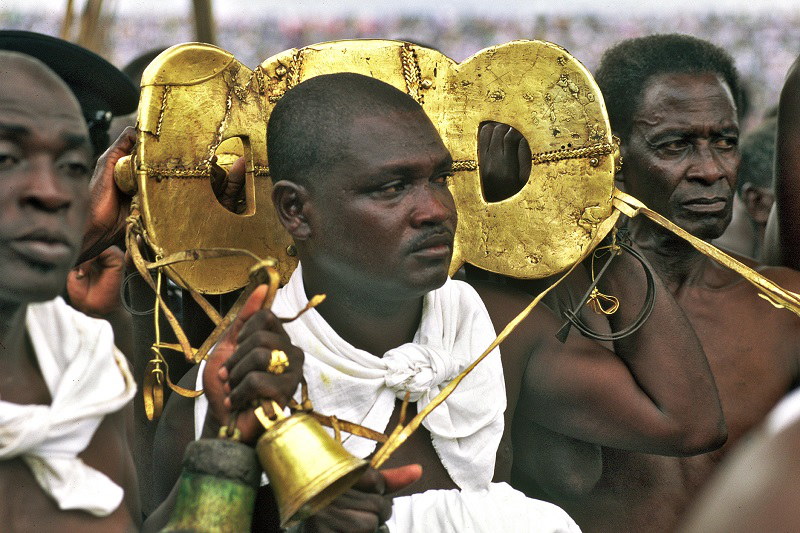Information
Each ride includes either the Akwasidae festival or the Egun festival.
Aquasai Festival (Ghana). In the Ashanti calendar, certain days are set aside each year for a special celebration at the Royal Palace in Kumasi. This traditional ceremony takes place in one of the last African Kingdoms, which has preserved its ancient rituals so far.
During this holiday, the king sits under an impressive colorful umbrella, is decorated with bright fabric and massive centuries-old decorations (gold jewelry and Ashanti masks are considered masterpieces of African art) and is surrounded by elders and Ashanti advisors, all under the authority of the Royal Speaker, who holds the symbols of power. Before the king, a narrow passage was also formed for dignitaries representing all the roles and positions of power in the kingdom: holders of swords and knives, armed guards, carriers of beautiful ostrich feather webs, and so on. The ceremony then proceeds with a procession of the royal court that bring gifts, the storytellers tell the story of Ashanti kings, the drummers & the trumpeters play ivory horns. Fat dancers in bright red costumes perform an erotic dance. The mother queen also joins the ceremony with her attendants. We will witness the splendor, taste and atmosphere of one of the last great African monarchs of the forest.
Akwasidae, races: April 12, July 5, August 16, September 27, November 8
Very important: a tour with April 12th will be special.
The people of Ashanti will celebrate the 20th anniversary of the reign of their king with a big festival.
Egun masks (Benin) . Egungun is a powerful secret masked society. Egunsky masks are a reincarnation of the dead people. The masks are impressively painted, covered with many pieces of fabric of red shades. They come out of the forest and form a procession through the streets of the village, jumping to any stupid spectator who dares to get too close. And no one wants Egun to touch him, because any contact carries the danger of being infected with death. When the masks arrive, they perform a kind of bullfight, designed to scare the crowd, but in fact they are actually met with a burst of laughter! December 27th arrival
In addition to one of these major traditional events, tour participants will always attend the following events:
- an interesting voodoo ceremony
- an exciting dance of fire
- Ashanti ceremonies: a festive celebration dedicated to the return of the ancestor’s spirit.
October 17, 2019 (Millet Festival, special itinerary and prices)
January 7, 2020 ( Voodoo Festival , special route and prices),
Tour program:
-
Lome, Gulf of Guinea TOGO Day 1
Arrival
Arrival in Lome (Togo) and transfer to the hotel.
Meals own arrangements
Overnight Hotel Onomo or similar (all rooms ensuite and with aircon)
-
Lome - Agbodrafo TOGO Day 2
Voodoo, from Lome to Agbodrafo (100 km – time of drive 3 hr)
Lomé, the vibrant capital of Togo, is the only African city which was a colony of the Germans, the British and the French. It is also one of the few capitals in the world bordering with another nation. These elements have led to the development of a unique identity reflected in the life style of its inhabitants and in the architecture of the town: Lomé is indeed a cross point for people, trade and cultures, a cosmopolitan city in small size. We will visit: the central market with its famous “Nana Benz”, women who control the market of the expensive “pagne” (=cloths) coming from Europe and sold all over West Africa; the colonial buildings in the administrative quarter where the flavour of colonial time is still very present.
Stop at the fetish market where we can find an eclectic assortment of all the necessary ingredients for love potions and magical concoctions.
In a remote village we will join a Voodoo ceremony: the frenetic rhythm of the drums and the chants of the adepts calls in the voodoo spirits who then takes possession of some of the dancers. They fall into a deep trance: eyes rolling back, grimaces, convulsions, insensitivity to fire or pain. Sakpata, Heviesso, Mami Water are just some of the voodoos divinities who can manifest. In this narrow village, surrounded by the magic atmosphere of the ceremony, we will finally understand what people mean when they say: “In your Churches you pray God; in our voodoo shrine we become Gods!”Meals B – L - D
Overnight Hotel du Lac or similar (all rooms ensuite and with aircon)
-
Agbodrafo - Ouidah TOGO & BENIN Day 3
"Brazilian” city, from Agbodrafo to Ouidah (70 km – time of drive 2 hr)
Today is Sunday. Meeting with Celestial Church: interesting example religious syncretism mixing voodoo and Christianity. We will meet the people, the priests, attending exorcism, prophesies and trances.
Benin border crossing (Hilla Kodji / Save Kodji)
Drive to Ouidah. Ouidah was conquered by the Dahomey Kingdom during the 18th century to become one of the main slave ports. Today Ouidah enjoys an Afro-Brazilian architecture, and the python temple faces the Catholic Cathedral. The laid-back attitude of the locals blends in harmoniously with the thunder of the distant waves and the rhythm of the drums - a timeless atmosphere well described by Bruce Chatwin in his book "The Vice-Roy of Ouidah". On foot we visit the Python Temple and the Portuguese Fort, now a small but interesting museum on the history of Ouidah and the transatlantic slave trade. We end the visit following the “slave road” to the beach, the point of “no return” where slaves were shipped to the “new world”.Meals B – L - D
Overnight Hotel Casa del Papa or similar, ocean front bungalows, wild beaches, swimming pool. (all bungalows ensuite with aircon)
-
Ouidah - Dassa Benin Day 4
Royal Palace, from Ouidah to Dassa (250 km – time of drive 5 hr)
We cross Lake Nokwe with a motorized boat to reach Ganvié, the largest and most beautiful African village on stilts. The approximately 25,000 inhabitants of the Tofinou ethnic group build their wooden huts on teak stilts. Fishing is their main activity. Ganvié has managed to preserve its traditions and environment despite the long-lasting human presence in a closed setting; and the lake is not over-fished. Daily life unfolds in the dugout canoes that adults and children row with ease using brightly coloured paddles. From these canoes men fishing, women expose goods at the “floating market”, children go to school and play.
Returned on the mainland we drive to Abomey where we visit the Royal Palace. The walls of the palace are decorated with bas-reliefs representing symbols of the ancient Dahomey kings. At the height of power the King has up to 4.000 wives living in the harem. Nowadays a museum, listed in the UNESCO World Heritage, displays items belonging to the ancient kings: thrones, cult altars, statues, costumes and weapons. A Kingdom whose economy was for a long time based on the slave trade: a permanent state of war made it possible for the kings to capture thousands of prisoners whom they then sold as slaves. The royal army included a female battalion feared for its boldness and cruel war behaviour. In the centre of the royal courtyard we discover a temple built with a mixture of clay, gold dust knead with the blood of thousands human sacrifices.For December 27th, 2019 departure the program will be modified to participate at the great event: Egun masks
-
Dassa - Natitingou BENIN Day 5
Fetish hills, from Dassa to Natitingou (350 km – time of drive 8 hr)
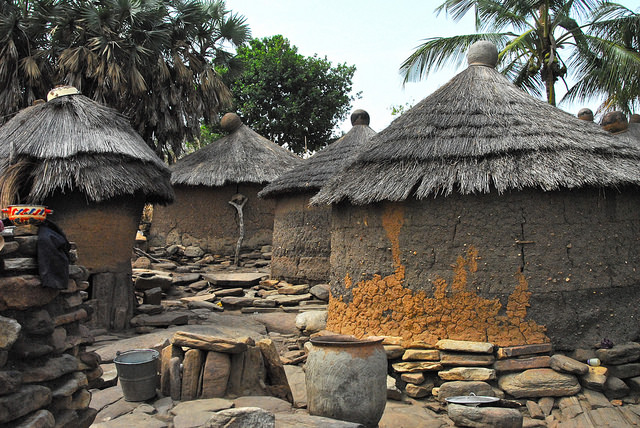
Early morning departure for a long but intense day. First stop will be at Dankoli Fetish, a unique shrine for ancient animistic cults still practiced: thousands of short sticks are pushed in and all around the fetish as testimony of the countless prayers for a good harvest, a happy wedding, an easy delivery, success at school etc. Once the prayers are answered, people come back to sacrifice what they had promised, according to the nature of the prayer. Fresh traces of sacrifice, palm alcohol and oil on the fetish are witnes that many prayers and requests have been fulfilled.
In the afternoon we discover old Taneka villages located on a mountain with the same name. The villages are made up of round adobe huts covered with a conical roof protected at the top by a terra cotta pot. The upper part of the village is inhabited by the young initiated and by the fetish priests who only cover themselves with a goat skin and always carry a long pipe. This ethnic group has been living on an archaeological site for centuries, in fact it looks as if the first inhabitants (from Kabye tribe origins) moved to the mountain during the IXth century. Since then, other ethnic groups have joined thus forming melting-pot where despite the fact that each group kept its own cults and initiation rites, common religious and political institutions were defined.
As we wander among the villages along alleys bordered by rocks with ancient and mysterious carved marks, only witnesses of populations who in the past have lived in these places.
We may come across young initiated, wearing only with a cover sex and magical amulets, or elders fetiche priest dressed with a skin. Taneka believe that in order to “become” a man, it is necessary to combine time, patience and many sacrifices. Initiation is a lifetime process life itself becomes a rite of passage, therefore life should not be conditioned by a “before” and an “after” but rather as following a continuous path.Meals B – L - D
Overnight Hotel Tata Somba or similar (all rooms ensuite and with aircon)
-
Natitingou - Sokode BENIN & TOGO Day 6
Fire Dance, from Natitingou to Sokode (180 km – time of drive 4 hr)
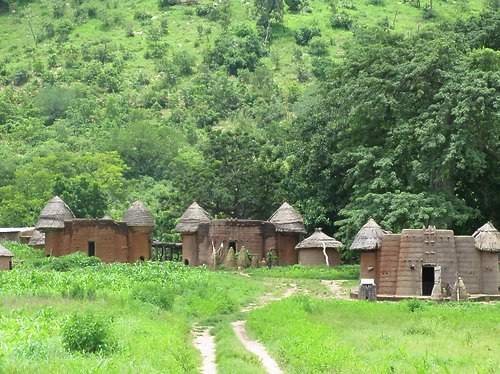
We enter the land of the Somba & Tamberma who live in adobe fortified dwellings. Similar in form to small medieval castles, they are one of the most beautiful examples of traditional African architecture. Their style impressed Le Corbusier vanguard architect that describe it as «sculptural architecture». In fact the houses are hand built, layer of clay after layer, adding round mud balls and shaping them as per the plan of the house. A kind of sensual gesture mixing strength, care and beauty. Their strong animistic beliefs are witnes by large shrines - of phallic form - at the entrance of their homes. With the permission granted to us by the elders we enter their homes to better understand their way of life. Actually their houses are a projection of their cosmology - the ground floor, with its darkness, represents death and is the place of the ancestors; the second floor, open to the sky, represents life and is the place where grandmothers keep babies until they “find out” which ancestor has come back as the new life - only then will the baby be allowed to come down from the terrace. All - family, food supplies and stock - are kept inside the fortified house, for safety and survival in case of attack by enemies. For centuries these populations have been seeking refuge in the Atakora Mountains to escape Muslim slave traders coming from the north.
Togo border
In the evening, we arrive at the villages of Tem tribe to discover the fire dance. At the centre of the village a large fire lights up the silhouette of the participants. They dance to the hypnotic beat of the drums eventually leaping into the glowing embers, picking up burning coals, passing them over their bodies and even putting them in their mouths and swallowing them. all this without hurting themselves or showing any sign of pain. It’s difficult to explain such a performance. Is it matter of courage? Self-suggestion? Magic? Maybe it really is the fetishes that protect them from the fire.Meals B – L - D
Overnight Hotel Central or similar (all rooms ensuite and with aircon)
-
Sokode to Kpalime TOGO Day 7
Rainforest, from Sokode to Kpalime (290 km – time of drive 5 hr)
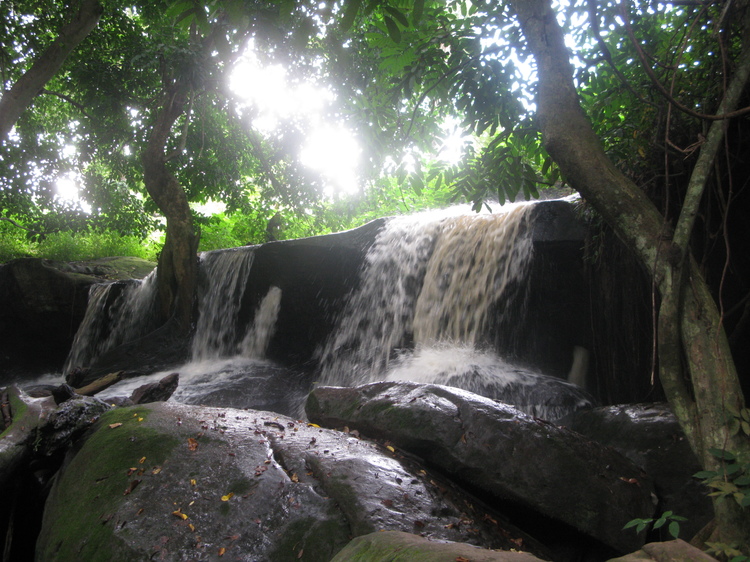
We will head southwards, with a stop on the way in Atakpame, a typical African small town built on hills where all the products coming from the nearby forests can be found. Through their skilled work on small weaving looms, men of the region make the large brightly coloured fabric called “Kente”.
From Atakpame we move to the tropical forests surrounding Kpalime, a town with a rich colonial past which is now an important cocoa and coffee trading market. Night Walk in the forest to discover the mysterious world of the tropical forest in the darkness and so meet with the majesty profile of tropical trees, the sounds of tam-tams and the echoes of wild animals. Under the guidance of a local entomologist, we will learn about endemic butterflies and colourful insects.Meals B – L - D
Overnight Hotel Gess or similar (all rooms ensuite and with aircon)
-
Kpalime - Koforidua GHANA Day 8
Glass beads, from Kpalime to Koforidua (220 km – time of drive 5 hr)
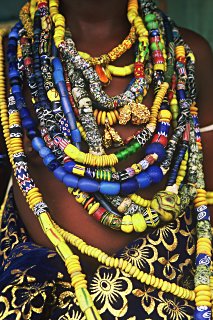
Ghana border crossing and continuation to the Volta Region.
Krobo tribe is known for its glass beads. Krobo people produce and wear glass beads for ceremonies and aesthetic purposes. We will visit an artisan community of beads producers and even experience the process of making our one bead. The craftsmen have been producing beads following the same long lasting traditional technique for centuries. They use scrap glass that is grounded into a fine powder. The glass powder is then meticulously made into patterns and placed into hand-made clay moulds covered in kaolin. The beads are cooked then decorated, washed and eventually strung.
We reach Koforidua on time to visit the weekly beads market, internationally known by beads collectors. Great opportunity for shopping.Meals B – L - D
Overnight New Capital View or similar (all rooms ensuite and with aircon)
-
Koforidua - Kumasi GHANA Day 9
Ashanti, from Koforidua to Kumasi (200 km – time of drive 5 hr)
Kumasi is the historical and spiritual capital of the old Ashanti Kingdom. The Ashanti people were one of the most powerful Kingdoms in Africa until the end of the 19th century, when the British annexed Ashanti Country to their Gold Coast colony. The tribute paid today to the Asantehene (=King) is the best evidence of their past splendour and strength. With nearly one million inhabitants, Kumasi is a sprawling town with a unique central market, one of the largest in Africa. Every kind of Ashanti craft (leather goods, pottery, Kente cloth) is found here, along with just about every kind of tropical fruit and vegetable.
The program includes a visit to the Ashanti Cultural Centre: a rich collection of Ashanti artefacts housed in a wonderful reproduction of an Ashanti house. In the afternoon we participate – if available – in a traditional Ashanti funeral, attended by mourners wearing beautifully red or black togas. We say “funerals” but it means a “festive” celebration: thanks to this ceremony the deceased return as an ancestor and will protect his family. Relatives and friends gather, socialize and celebrate his/her memory. The chief arrives surrounded by his court under the shade of large umbrellas while drums give rhythm to the dancers whose intricate moves are highly symbolic in war and erotic meanings.Meals B – L - D
Overnight Miklin Hotel or similar (all rooms ensuite and with aircon)
-
Kumasi GHANA Day 10
Golden Kingdoms, Kumasi (transfers)
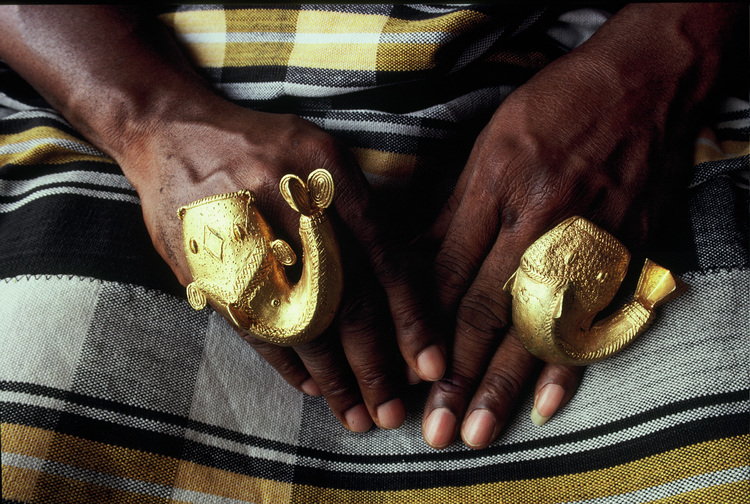
In the morning continuation of the tour of Kumasi, with the visit of the Royal Palace Museum hosting a unique collection of gold jewels worn by the Ashanti court. In the afternoon visit of Ashanti villages with traditional clothing and carving.
If the date coincides, the program will be modified to participate at the great event: Akwasidae Festival
Meals B – L - D
Overnight Miklin Hotel or similar (all rooms ensuite and with aircon)
-
Kumasi - Anomabu GHANA Day 11
Slaves’ Castles, from Kumasi to Anomabu (250 km – time of drive 4 hr)
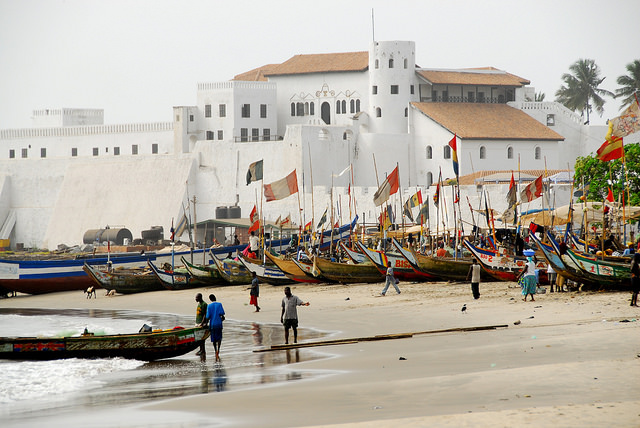
Drive to the coast.
Elmina Castle, the oldest European building in Africa, erected by the Portuguese in the 15th century. At different times the castle has been used as a warehouse to trade gold, ivory, and eventually slaves. The castle we visit today is the result of successive extension works and is recognized as a UNESCO World Heritage site. The old Dutch Cemetery in Elmina goes back to 1806. Outside the castle, a spectacular fishing village with lots of large colourful fishing boats - every day these wooden large pirogues conducted by skilled fishermen across strong ocean waves and currents, “fighting” to earn a living. In the old town we will see the Posuban, the shrines of the ancient “Asafo companies” - the warriors who used to put their offerings on the large colourful statues. The alleys in the old town have a very lively atmosphere, bringing us back to a time when Elmina was a busy colonial town.Meals B – L - D
Overnight Anomabu Beach Resort or similar, Ocean front resort with comfortable bungalows on the beach. (all bungalows ensuite and with aircon)
-
Anomabu - Accra GHANA Day 12
Metropolis, from Anomabu to Accra (180 km – time of drive 3 hr)
Drive to Accra.
Accra, the capital of Ghana, has maintained its unique identity despite the fast-paced development currently underway in this intriguing African city. The program includes a visit to the National Museum (if open), one of the first works of independent Ghana - the idea inspiring the Museum is to relate Ghanaian art to the rest of the continent and to prove the existence of an African history as part of the general history of humanity. We explore the old quarter of James Town, inhabited by the local population known as the Ga. Our tour ends with the visit of a workshop where they specialize in building fantasy coffins. These special handcrafted coffins can reflect any shape: fruits, animals, fish, cars, airplanes…. the only limit being imagination! Started in Africa, these flamboyant coffin designs are by now collected worldwide and exposed in museums.
In the evening transfer to the airport for the flight out.Meals B – L
Day-use Rooms in day-use till 18.00 hrs (all rooms ensuite and with aircon)
Program cost per person in 1/2 dbl accomodation - double room
With a group of 6 + people - 2,540 euros
Individually from 2 people 2870 euros
Surcharge for single occupancy
Surcharge for single occupancy 485 Euros.,
Included
- Assistance at airport upon arrival (day 1) and departure (day 12)
- Transfers and tour in minibuses/microbuses and/or 4WD vehicles
- Local guide (languages spoken: English, French, German, Italian and Spanish)
- Tours and visits as per the programme
- Accommodation in standard rooms, as per itinerary
- All meals as described: B = breakfast, L = lunch, D = dinner
- Mineral water in the bus/car during the visits
- Entrance fees to parks, concessions, protected areas and cultural sites
- First Aid box
- All service charges and taxes
Not included
- International flights
- Earlier (prior day 1) and/or later (after day 12) transfers from and to airport
- Visa fees and any airport departure taxes
- Any meal or sightseeing tour other than those specified
- Mineral water and drinks at meals
- Porterage
- Fees for personal photos and videos
- Personal and holiday insurance (compulsory)
- Tips for drivers, guides and hotel staff
- Costs relating to delayed or lost luggage
- Any item of personal nature such as phone calls, laundry, etc.
- Whatever is not mentioned as included
Information
- VISAS: Togo - two entries visa; Ghana & Benin - single entry visa
- VACCINATIONS: Yellow fever – compulsory; malaria prophylaxis - highly recommended.
- MEALS: lunch, picnic or at local restaurants (tourist menus); dinner at the hotel restaurant (tourist menu)
- LUGGAGE: max 20 kg and in duffle bags.
- TRAVEL INSURANCE: Not included. Mandatory for medical assistance, repatriation, material and physical damages.
- MEANS OF TRANSPORTATION: microbus or minibus or 4x4 vehicles
- DRIVING HOURS: example: Day 12: from Anomabu to Accra (180 km – 3 hr.). The driving hours includes the pure driving hours and not stops and visits
- All our trips are designed to be flexible so that we can adapt to weather conditions, focus on the group’s interests and take advantage of opportunities that arise once there.
- Considering the special nature of the journey, some parts may be modified due to unpredictable factors and are based on unarguable decisions of the local guide. Costs originating from such variations will be sole responsibility of the participants. Of course, the guide will do his/her utmost to adhere to the original program.
- There are 5 border-crossings in African countries, hence some delays are to be expected and patience is necessary.
- Prices could change in case of major changes in services costs, beyond the organizer’s will
Terms and conditions
Payment policy
A deposit of 30% is required at the time of confirmation and the balance is due to TransAfrica not less than 14 days before the arrival of guests at the destination.
If the reservation is made within 30 days of departure, the whole amount must be paid at the time of confirmation.
Failure of the booking agent to comply with these payment terms will result in automatic cancellation of the reservation and all applicable cancellation fees will be charged. Bookings not secured by the appropriate deposit will be released.
Cancellation policy
In the event of a cancellation 30 days in advance the deposit will be refunded.
For any cancellation received after 30 days the following conditions and cancellation fees apply:
29 - 18 days prior to departure 30% of tour cost
17 - 10 days prior to departure 50% of tour cost
09 - 04 days prior to departure 75% of tour cost
03 - 0 days prior to departure 100% of tour cost
• voodoo ceremonies
• Ganvie village, African Venice
• artifacts of imeria Abomey
• fiery dances
• lost tamberm fortresses
• secrets of blacksmiths and sorcerers villages
• the golden kingdom of Ashanti
• Portuguese fortresses, a heritage of colonial times
• In each of the programs there is a special event (the Akvasidai festival, the harvest festival of Miletus and others, depending on the date of arrival)
Countries
